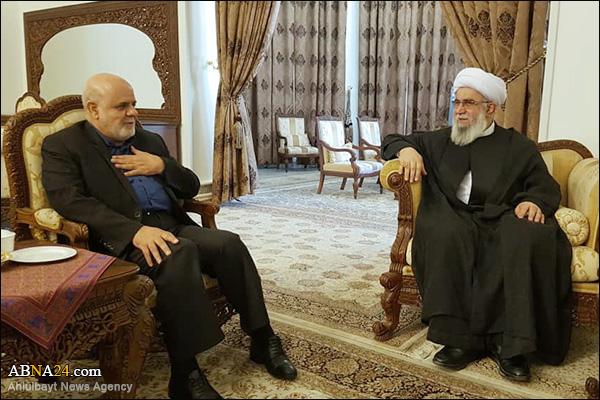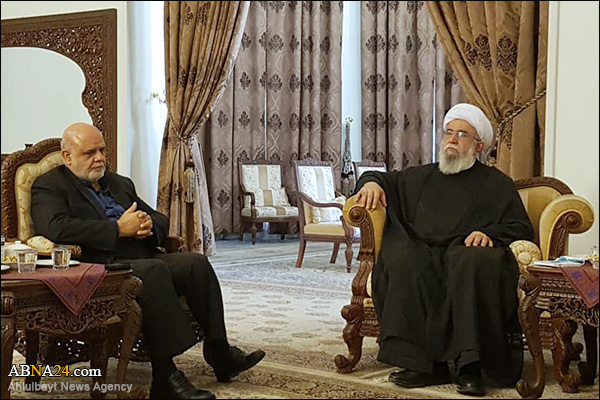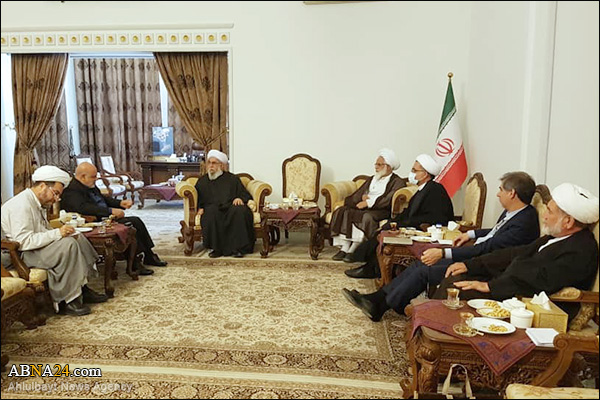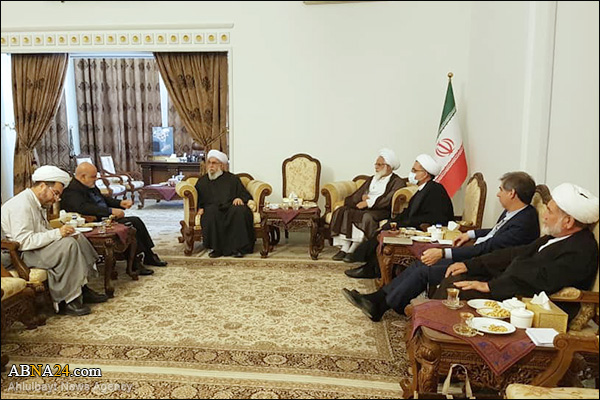ABWA can be effective in communicating with Iraqi elite, youth: Ayatollah Ramazani
During his visit to Iraq, the Secretary-General of the AhlulBayt (a.s.) World Assembly met the Iranian Ambassador to Iraq, Iraj Masjedi.
Saying that we have had the strongest relations with Iraq in various fields, Ayatollah Reza Ramazani stated, “Given the existence of different parties in Iraq, there is a need for comprehensive planning in communicating with Iraq’s elites of society and the government.”
“Previously, we did not think we would reach this level of relations between Iran and Iraq. At present, Iran’s relations with other countries are not as extensive as those with Iraq. Due to the many commonalities, it is easy to work in Iraq. But there are also some differences in this regard,” he continued.
“Neither a mere negative outlook and despair is appropriate, nor an absolutely positive outlook. Rather, there should be a conditional positive attitude with caution. From experience, we conclude that we should have a positive but conditional view,” he emphasized.
“We must be connected to the Iraqi society and the young generation. Unfortunately, we have neglected the field of educating the youth in Iraq, and we have not had any educational programs. Therefore, we must communicate with the Iraqi elite, as influential elements, and the Iraqi youth and the Assembly can play a role in this regard,” stated the Secretary-General of the AhlulBayt (a.s.) World Assembly about the necessity of communication with the Iraqi society, referring to Iran’s regional power.
“The Assembly does not have a mere traditional approach to activities. Today, if we do not have a strategy for cyberspace, we will suffer in this field. The enemy’s cyberspace is in our homes and we must work hard in this regard,” he said, regarding the new plans of the AhlulBayt (a.s.) World Assembly.
“Iran’s ambassador and Cultural Attaché in Iraq and the Assembly’s representative in the country should not work only for Iraq because Iraq has an international capacity. Iraq can enter into cultural interactions on the world stage, and we can play a role in this regard. Therefore, it is necessary to use the capacity of the cities of Karbala, Najaf, Baghdad, and the shrine of Imam Hussein (a.s.) and the shrine of Hazrat Abbas (a.s.),” stated Ayatollah Ramazani.
“Grand Ayatollah Sistani has an international capacity. The AhlulBayt (a.s.) World Assembly is the connecting link between the Marjaiat and the followers of AhlulBayt (a.s.) in the world,” he emphasized.
“We must stand up to the United States and not give in to it. This is the meaning of resistance jurisprudence. In the meeting we had with the elites of Samarra, everyone agreed on the fight against arrogance. Imam Khomeini’s global influence in the fight against arrogance can be seen in these situations. Today, Iraq and other countries are fighting against oppression, while in the past no one dared to do so,” he said, emphasizing the need for communication between Iranian and Iraqi scholars.
“In the issue of proximity of Shiite and Sunni schools, and the section related to the AhlulBayt (a.s.), we declare our readiness for cooperation,” said the Secretary-General of the AhlulBayt (a.s.) World Assembly, introducing the city of Samarra as an important platform for proximity between Sunni and Shia.
At the beginning of the meeting, Iraj Masjedi, Iran’s ambassador to Iraq, presented a report to the Secretary-General of the AhlulBayt (a.s.) World Assembly on the rise of Shiite parties in Iraq after the fall of Saddam and the hardships to which these groups are facing, the problems of Shiite groups to serve the people after coming to power, American Evils and Conspiracies, the rise of ISIL and other terrorist groups in Iraq, the position of Al-Hashd Al-Shabi (Iraqi popular Mobilization forces) and resistance groups in this country, Iran’s capabilities and successes in Iraq, the role and position of Grand Ayatollah Sistani, and Marjaiat in the Iraqi political arena, the need to communicate with the Iraqi people and parties, the need to work in the cultural and social fields of Iraq, and the policies of the Islamic Republic of Iran and its requirements in the new conditions.



During his visit to Iraq, the Secretary-General of the AhlulBayt (a.s.) World Assembly met the Iranian Ambassador to Iraq, Iraj Masjedi.
Saying that we have had the strongest relations with Iraq in various fields, Ayatollah Reza Ramazani stated, “Given the existence of different parties in Iraq, there is a need for comprehensive planning in communicating with Iraq’s elites of society and the government.”
“Previously, we did not think we would reach this level of relations between Iran and Iraq. At present, Iran’s relations with other countries are not as extensive as those with Iraq. Due to the many commonalities, it is easy to work in Iraq. But there are also some differences in this regard,” he continued.
“Neither a mere negative outlook and despair is appropriate, nor an absolutely positive outlook. Rather, there should be a conditional positive attitude with caution. From experience, we conclude that we should have a positive but conditional view,” he emphasized.
“We must be connected to the Iraqi society and the young generation. Unfortunately, we have neglected the field of educating the youth in Iraq, and we have not had any educational programs. Therefore, we must communicate with the Iraqi elite, as influential elements, and the Iraqi youth and the Assembly can play a role in this regard,” stated the Secretary-General of the AhlulBayt (a.s.) World Assembly about the necessity of communication with the Iraqi society, referring to Iran’s regional power.
“The Assembly does not have a mere traditional approach to activities. Today, if we do not have a strategy for cyberspace, we will suffer in this field. The enemy’s cyberspace is in our homes and we must work hard in this regard,” he said, regarding the new plans of the AhlulBayt (a.s.) World Assembly.
“Iran’s ambassador and Cultural Attaché in Iraq and the Assembly’s representative in the country should not work only for Iraq because Iraq has an international capacity. Iraq can enter into cultural interactions on the world stage, and we can play a role in this regard. Therefore, it is necessary to use the capacity of the cities of Karbala, Najaf, Baghdad, and the shrine of Imam Hussein (a.s.) and the shrine of Hazrat Abbas (a.s.),” stated Ayatollah Ramazani.
“Grand Ayatollah Sistani has an international capacity. The AhlulBayt (a.s.) World Assembly is the connecting link between the Marjaiat and the followers of AhlulBayt (a.s.) in the world,” he emphasized.
“We must stand up to the United States and not give in to it. This is the meaning of resistance jurisprudence. In the meeting we had with the elites of Samarra, everyone agreed on the fight against arrogance. Imam Khomeini’s global influence in the fight against arrogance can be seen in these situations. Today, Iraq and other countries are fighting against oppression, while in the past no one dared to do so,” he said, emphasizing the need for communication between Iranian and Iraqi scholars.
“In the issue of proximity of Shiite and Sunni schools, and the section related to the AhlulBayt (a.s.), we declare our readiness for cooperation,” said the Secretary-General of the AhlulBayt (a.s.) World Assembly, introducing the city of Samarra as an important platform for proximity between Sunni and Shia.
At the beginning of the meeting, Iraj Masjedi, Iran’s ambassador to Iraq, presented a report to the Secretary-General of the AhlulBayt (a.s.) World Assembly on the rise of Shiite parties in Iraq after the fall of Saddam and the hardships to which these groups are facing, the problems of Shiite groups to serve the people after coming to power, American Evils and Conspiracies, the rise of ISIL and other terrorist groups in Iraq, the position of Al-Hashd Al-Shabi (Iraqi popular Mobilization forces) and resistance groups in this country, Iran’s capabilities and successes in Iraq, the role and position of Grand Ayatollah Sistani, and Marjaiat in the Iraqi political arena, the need to communicate with the Iraqi people and parties, the need to work in the cultural and social fields of Iraq, and the policies of the Islamic Republic of Iran and its requirements in the new conditions.









